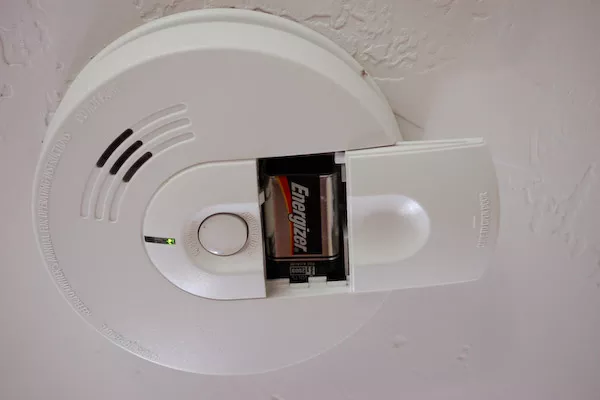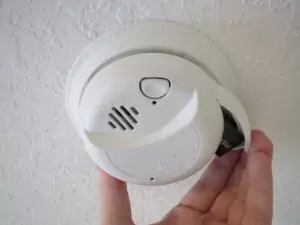
09 Jul Chirping Smoke Detector? Fix or Replace it
Chirping Smoke Detector? Fix it or Replace it
When a smoke detector sounds a blaring alarm, most homeowners know that they should get out of the house and call the fire department. However, it’s less obvious how to handle a chirping smoke detector. The homeowner may wonder if the chirp is also indicating a potential fire, or if it means something else. Some homeowners don’t even realize the smoke detector is causing the chirp they’re hearing.
A chirping smoke detector lets the homeowner know that the smoke detector is not functioning properly or won’t be functioning properly in the near future. It does NOT indicate a fire. Here are some reasons why the smoke detector may chirp and how to resolve the issue.
*Keep in mind that this blog post is meant to help with a smoke detector that isn’t monitored by ADT. If it is monitored and there’s an issue, your keypad and/or ADT would let you know about it.
Battery
Many smoke detectors will chirp to let the homeowner know that the battery is dying. Often a smoke detector has one 9 volt battery or two AA batteries inside. These should be replaced every six months. If the smoke detector starts to chirp, replace the batteries immediately, regardless of where you are in the 6 month replacement cycle. Then test the detector to make sure it functions properly. Hopefully, the chirping stops and the detector resumes normal function.
Please don’t remove the battery without installing a new battery. Yes, removing the battery makes the chirping noise stop. It also makes the smoke detector useless. The rate of fire-related deaths increases significantly in homes where a smoke detector has been disabled or doesn’t exist. If you don’t have replacement batteries on hand, go out and buy new batteries immediately. Once the chirping has stopped, it’s easy to forget that you need new batteries. Manufacturers intentionally have the detector make an annoying chirping noise so homeowners addresses the issue.
End of Life
According to the National Fire Protection Agency (NFPA) smoke detectors need to be replaced every 8-10 years. Many homeowners don’t realize that smoke detectors expire. And some smoke detectors don’t come with replaceable batteries. Those detectors only have a battery life of 10 years. Often a smoke detector will have a date on it to indicate when it should be replaced. If the detector starts to chirp, take it down and look for a date. If the date has passed, replace the detector with a new one immediately.
For smoke detectors that do have replaceable batteries, we still recommend that the detector be replaced every 8-10 years. Think about how old your smoke detectors are and consider replacing them with new ones.
Retain the Same Number of Smoke Detectors
Some homeowners realize that the chirping smoke detector needs to be replaced, but instead of replacing it, they just remove it from the home. NFPA recommends every home has a smoke detector in each sleeping area and on each level of the home. Therefore if the detector in one bedroom starts chirping it is not safe just to rely on the detector in a nearby bedroom. The chirping detector should be replaced so the same number of total smoke detectors exists in the house.
Consider Connected Smoke Detectors
If your smoke detector is chirping and it’s time for you to replace it, you’ll have to make the decision about which type of smoke detector to buy. Photoelectric smoke detectors are best for smoldering fires whereas ionization smoke detectors are quicker to identify fires with significant flames. Both types of fire can occur in a home. Many experts recommend using a combination of both types of smoke detectors throughout a house. You may also want to consider supplementing them with a connected smoke detector such as the ADT Wireless Smoke and Heat Detector. You will be improving the safety of your family by having help notified automatically if a fire occurs. The quicker the fire department is aware of a fire, the quicker they can respond, which may save lives.
For additional information about smoke detectors, contact us.



No Comments